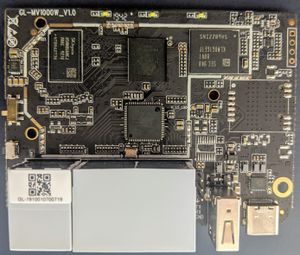GL MV1000W from GL iNet AKA Brume: Difference between revisions
mNo edit summary |
mNo edit summary |
||
| Line 44: | Line 44: | ||
* Hit "gl" key to stop booting in X seconds. | * Hit "gl" key to stop booting in X seconds. | ||
** First that's gl, as in g+lowercase"L" (l as in Larry, thank English Language and modern computer for making l I and <span style="font-family: 'Gill Sans';">1</span> | ** First that's gl, as in g+lowercase"L" (l as in Larry, thank English Language and modern computer for making l I and <span style="font-family: 'Gill Sans' !important;">1</span> | ||
Revision as of 18:56, 19 August 2024
...a great little device that doesn't seem to be made anymore: GL-iNet GL-MV1000W
- Dual 1 GHz CPUs
- 1 GB of RAM
- micro SD Card Slot
- PLUS
- Small Form Factor
- USB C Power
- 3 Port Switch
- Antennas can be removed and replaced with RP-SMA Connectors fairly easily
- 8 GB MMC Storage Built in (but it has to be "earned")
- MINUS
- USB 2.0 Only
- No PCIe Bus, wireless is USB too
- Wireless has to be "earned" too
https://openwrt.org/toh/gl.inet/gl-mv1000
Installing OpenWRT

The Serial / TTL Header is just there. 3 Pins, already on the System Board (near bottom of image to the right of the grayish rectangle (Ethernet Ports) and just to the left of the silver rectangle(s) (USB A and USB C Ports)) with the 'PIN Legend' printed on the SystemBoard (GND nearest the closest edge, then RX (Receive), and TX (Transmit)).
Serial Port Settings for PuTTY, SecureCRT, etc: 115200, 8, None, 1, No (That's Baud Rate, Data Bits, Parity, Stop Bits, Flow Control).
Hook it up, plug it in, and OpenWRT. Job done! Nope (but it really is OpenWRT, just a special custom 'flavor' from GL-iNet)
Installing a New Install of OpenWRT from the Device's OEM Version of OpenWRT is not Possible
...but to try it out and see;
After connecting to the TTL / Serial Port, plug a cable into the Internet Ethernet Port.
opkg install wget (the BusyBox version of wget won't work with modern TLS / SSL)
wget https://downloads.openwrt.org/releases/23.05.0/targets/mvebu/cortexa53/openwrt-23.05.0-mvebu-cortexa53-glinet_gl-mv1000-ext4-sdcard.img.gz, or whatever the latest version of OpenWRT is. And no, the "SD Card" version doesn't have to be installed on an SD Card (funny thing is that the large internal storage on this device is based on an MMC (Multi-Media Card) that is soldered to the SystemBoard. The important part about which version (EXT4, InitRAMFS, or SquashFS) is that it uses the EXT4 file system which will be important later (part of the "earning" the 8 GB of storage thing). There is also not going to be a debate as to which file system is 'kinder' to Solid State Storage as only EXT 4 will be able to take FULL advantage of the 8 GB of storage (in a non-convoluted way).
gunzip WhatEverFileName.gz > WhatEverImageName.img
sysupgrade /WhatEverImageName.img See, it won't work as GL-iNet decided they weren't going to allow it (odd, since they seem so OpenWRT friendly compared to most manufacturers).
This was included as a long, passive agressive, 'Implicitish' (#Implicitish, come on, only 5 other instance of this word on the internet according to Google as of mid TwentyTwoFour) commentary for the person that decided to include the rather useless Upgrading OpenWrt Section for this device on the OpenWRT.org website.
Installing a New Install of OpenWRT from
After connecting to the TTL / Serial Port, plug a cable into the Internet Ethernet Port (again), get ready to press the 'gl' key. Wait! What? The actual message you will see is;
- Hit "gl" key to stop booting in X seconds.
- First that's gl, as in g+lowercase"L" (l as in Larry, thank English Language and modern computer for making l I and 1
(That's a lower case l, Upper Case I (as in Insulting), and the number One) Seriously!?!?!?